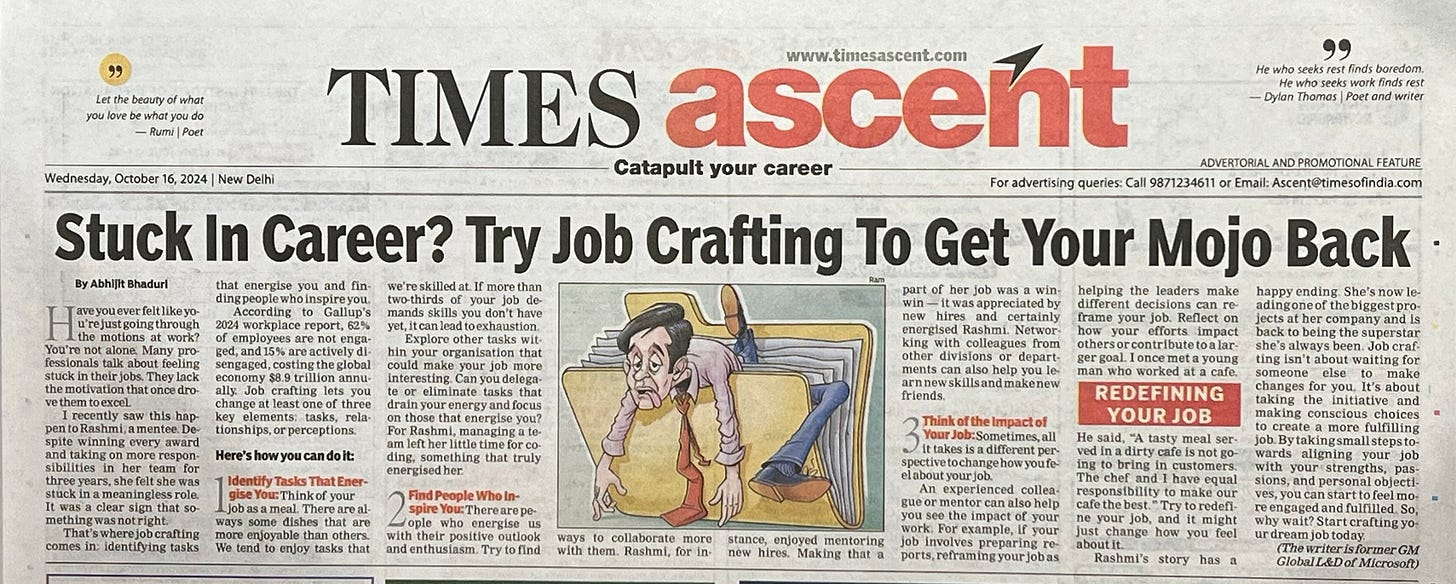Want to add fun to your job? Try Job Crafting
Have you ever felt like you're just going through the motions at work? Get your mojo back. Here's how
I recently saw this happen to Rashmi, when she approached me. Despite winning every award and taking on more responsibilities in her team for three years, she felt that she was stuck in a meaningless role. It was a clear sign that something was not right.
According to Gallup's 2024 State of the Global Workplace report, a staggering 62% of employees are not engaged, and 15% are actively disengaged, costing the global economy $8.9 trillion annually. Many professionals talk about feeling stuck in their jobs. They lack the motivation and inspiration that once drove them to excel. That's where job crafting comes in.
Disengaged employees are less likely to put in effort, take initiative, or go above and beyond in their roles. They tend to do the bare minimum, which directly affects their productivity. Disengaged employees might also find it more challenging to reengage later or transition to new roles that require higher levels of enthusiasm and commitment. Their disinterest often leads to:Lower quality of workFrequent mistakesMissed deadlines
It's about making conscious changes to at least one of three key elements: tasks, relationships, or perceptions. Here's how you can do it
Identify Tasks That Energize You
Think of your job like a meal. There are always some dishes that are more enjoyable than others. We tend to enjoy tasks that we're skilled at. If more than two-thirds of your job demands skills you don’t have yet, it can lead to exhaustion.
Explore other tasks within your organization that could make your job more interesting. Can you delegate or eliminate tasks that drain your energy and focus on those that energize you? For Rashmi, managing a team left her little time for coding, something that truly energized her.
2. Find People Who Inspire You
There are people who energize us with their positive outlook and enthusiasm. Try to find ways to collaborate more with them. Rashmi, for instance, enjoyed mentoring new hires. Making that a part of her job was a win-win – it was appreciated by the new hires and certainly energized Rashmi. Networking with colleagues from other divisions or departments can also help you learn new skills and make new friends.
3. Think of the Impact of Your Job
Sometimes, all it takes is a different perspective to change how you feel about your job. A meeting with the CEO helped Rashmi understand the strategic importance of her project.
An experienced colleague or mentor can also help you see the impact of your work. For example, if your job involves preparing reports, reframing your job as helping the leaders make different decisions can reframe your job. Reflect on how your efforts impact others or contribute to a larger goal. I once met a young man who worked at a cafe. He said, “A tasty meal served in a dirty cafe is not going to bring in customers. The chef and I have equal responsibility to make our cafe the best.” Try to redefine your job, and it might just change how you feel about it.
Disengaged employees may feel dissatisfied but may stay in the role due to financial needs or a lack of alternatives. Over time, this tension between staying and not caring about the work builds up, resulting in:Mental fatigueEmotional exhaustionPhysical symptoms like headaches or sleep disturbances
Rashmi's story has a happy ending. She's now leading one of the biggest projects at her company and is back to being the superstar she's always been. Job crafting isn't about waiting for someone else to make changes for you. It's about taking initiative and making conscious choices to create a more fulfilling job. By taking small steps towards aligning your job with your strengths, passions, and personal objectives, you can start to feel more engaged and fulfilled. So, why wait? Start crafting your dream job today.
A version of this was published by Times of India on 16 October 2024 for their Ascent page






I have finished the Graphic Design Course (https://gict.co.in/graphic-design-course/), and it was superb! Learned all the essential instruments and techniques to realize creative concepts. Very highly recommend it!
At times there are things we know but don't realize. Your posts make such subtle tacit knowledge much more applicable. Thank you for sharing. This made a great deal of difference.